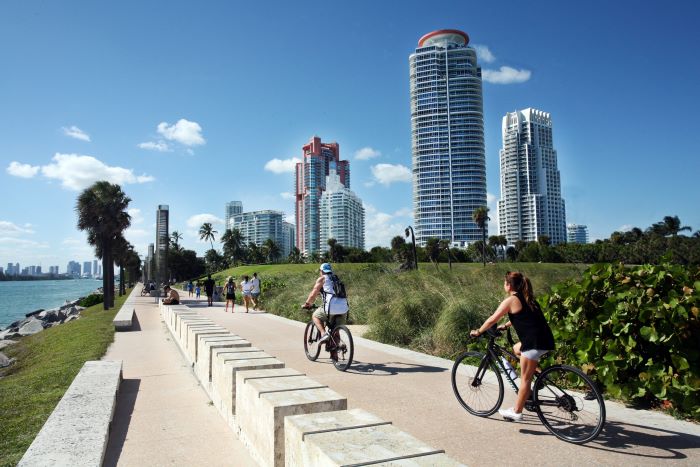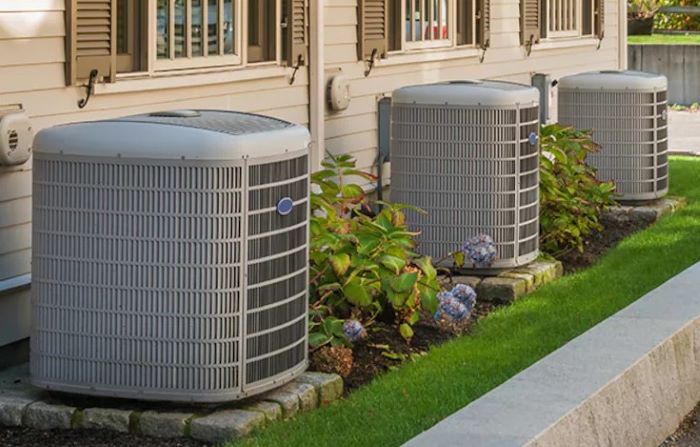Overview of Miami Climate
Miami is a city known for its gorgeous beaches and natural beauty. However, Miami’s tropical monsoon climate classification makes it difficult to maintain temperature control and keep your home comfortable, especially during the summer months. As a result, Miami experiences hot and humid weather in the summer and mild and dry winters. The average annual temperature in Miami is 77 degrees F (25 degrees C), and there are high humidity levels.
On the other hand, heating requirements in Miami are relatively minimal compared to other US cities. This is because the city enjoys mild winters and a subtropical climate, so the demand for heating systems is lesser than for cooling systems. Still, residents must invest in sustainable heating solutions to reduce their carbon footprint.
Due to the combination of high temperature and humidity, a good HVAC system is a must. Unfortunately, an inefficient system could lead to increased energy consumption and negative environmental impact. Take time to choose an HVAC system that effectively addresses the unique climate needs in Miami so you can keep your home comfortable while reducing energy costs and environmental impact.

Importance of Eco-Friendly HVAC Systems
Miami residents should prioritize choosing an eco-friendly HVAC system to cool or heat their homes. This investment can go a long way in providing many benefits to your home and the environment.
1. Reduced Energy Consumption and Costs
An efficient HVAC system is designed to optimize its energy consumption. The system uses advanced technologies that cool and heat your home using less energy, increasing the efficiency of the entire system. In addition, the individual components are energy-efficient, so less energy is used than in running a traditional HVAC system.
This reduced energy consumption translates to energy savings. Optimizing the performance of your HVAC system in Miami can lower your electric bills, and those savings add up over time.
2. Improved Indoor Air Quality
An eco-friendly and efficient HVAC system can also improve indoor air quality compared to conventional systems. Eco-friendly systems incorporate air filtration systems, such as HEPA filters. The filtration system captures and removes harmful air particles to ensure healthy and clean indoor air.
If you have family members with allergic conditions, investing in eco-friendly HVAC systems with good filtration systems reduces irritants in the air for them.
3. Prevent Mold and Excess Moisture
The higher the humidity level, the more moisture buildup inside your home. It’s one of the risks that Miami homeowners must consider when choosing an HVAC system. Eco-friendly systems feature dehumidification and humidity control settings that remove excess moisture in the air.
When humidity levels in the air are optimized, the possibility of mold and mildew growth is also reduced. Not only is exposure of these microorganisms harmful to humans, but they can also cause damage to your building.
4. Improved Comfort
An eco-friendly HVAC system is highly efficient and works less to cool your home. As a result, you can cool your home effectively, creating a more comfortable environment. Some advanced systems even offer superior features, such as precise temperature control to optimize cooling performance even in the thick of the summer months.
Even when the external conditions might fluctuate, the internal temperature is stable and comfortable.
5. Lower Carbon Footprint
Reducing the potential negative environmental impact is the primary benefit of switching to an eco-friendly HVAC system. You can combat the effects of climate change by taking small measures to reduce carbon emissions. Choosing HVAC systems that utilize clean energy and operate efficiently offers sustainable environmental benefits.

How to Choose an Eco-Friendly HVAC System
Knowing the benefits of eco-friendly HVAC systems in Miami, the next step is understanding the guidelines for choosing the right system. You must consider various factors, such as the following:
1. Energy Efficiency Rating
Check the Seasonal Energy Efficiency Ratio (SEER) rating when investing in a new HVAC system. These ratings tell you how efficient a given system is and whether it’s suitable for your home.
Look for a higher rating as it means higher energy efficiency. You must also look for the ENERGY STAR certification as it demonstrates that the system has satisfied the energy efficiency standards set by the Environmental Protection Agency (EPA).
2. Renewable Energy Integration
Choose systems integrating renewable energy sources, such as geothermal heating and cooling. Harnessing renewable energy sources provides a more efficient way to run the heating and cooling system without relying heavily on the electric grid. It also helps to reduce your carbon footprint over time.
3. Ductless Systems
Ductless HVAC systems are more energy-efficient than conventional ducted systems. You can even opt for the mini-split versions to deliver individualized temperature control, which reduces energy waste and optimizes heating and cooling performance.
4. Advanced Controls
Invest in HVAC systems that offer advanced and personalized controls, such as programmable thermostats. These features enable you to control the settings to suit your requirements and external conditions. Therefore, the system won’t have to work harder to cool your home when you only need minimal cooling.
5. Proper Sizing
Choosing the right sized unit for your home is also essential in selecting a highly-efficient and eco-friendly HVAC system. Consider the square footage of your home or room and choose the system that fits into the cooling requirements of the space. If the system is mismatched to the size of the space, the system has to work harder to produce cooling. And when the system works harder, it consumes more energy.
Aside from the size of the room, consider the insulation and external climate conditions, too.
6. Ask a Professional
When all else fails, consult an HVAC professional to help you find the most efficient HVAC system for your Miami home. They understand the unique challenges of the Miami climate best and can use their expertise to match the right system to your needs. In addition, some professionals will inspect and assess your space to help them determine your HVAC needs and suggest the right solution.
Final Thoughts
Heating and cooling requirements in Miami are unique compared with other cities. If you live in the city and need to install an HVAC system, consider an eco-friendly system that produces more effective and efficient cooling without spending more. Aside from considering the climate conditions in Miami, you should also assess the unique and spatial needs of your home to find the right solution.
